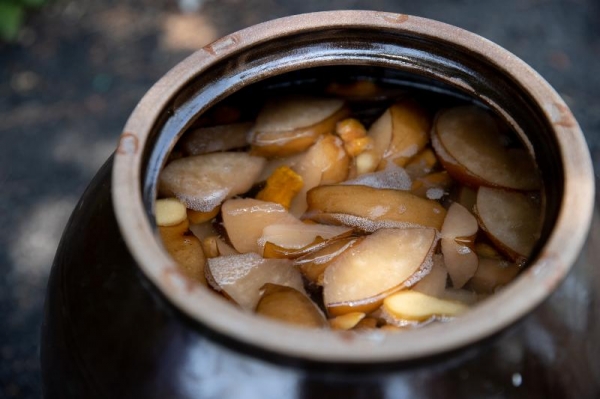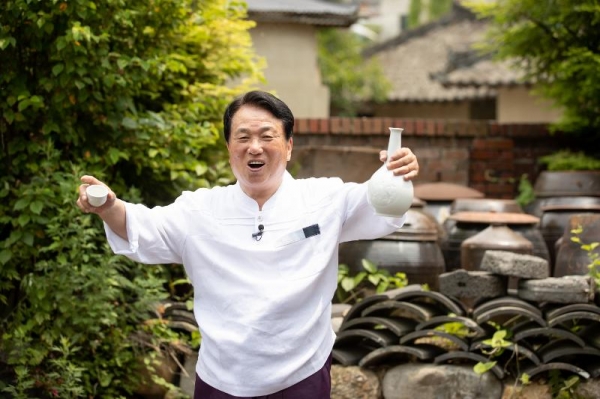

Jeonju, Jeollabuk-do Province, since ancient times has been renowned as a city of nobility and gourmet cuisine.
As the capital of the Later Baekje Kingdom (900-936) and the birthplace of the royal family of the Joseon Dynasty (1392-1910), the city was also the first in Korea to gain designation as a UNESCO City of Gastronomy. Nowadays, Jeonju is packed with visitors seeking high quality food.
A place with a highly developed culinary culture must have liquor. Korea has a culture of homebrewing liquor, but Jeonju has many conditions that make it easy to produce liquor at home. The city was among the three most populous during the Joseon era based on the number of households, along with the capital Hanyang (now Seoul) and Pyeongyang.
Jeonju had its region's largest granary and the residences of many nobles and wealthy families, who made liquor for serving guests and holding jesa and charye (ancestral memorial rituals). The liquor was hailed as high end and led to the coinage of the phrase myeonggamyeongju, or "A renowned household has good liquor."
Leegangju is the leading homemade liquor of Jeonju. The drink's name is derived from its ingredients -- Jeonju pear and ginger from the town of Bongdong-eup in Wanju-gun County. Tumeric, cinnamon and honey are also added.
Tumeric, uncommon at the time, was a valuable ingredient cultivated in Jeonju and used in the liquor presented as a gift to the king, who also received Jeonju pears and ginger from Bongdong-eup.
Historian and poet Choi Nam-seon (1890-1957) in his book "Joseon Sangsik Mundap" (unofficial translation: Questions and Answers on Joseon Common Knowledge) named leegangju one of the top three liquors of Joseon along with gamhongno and juknyeokgo.
Those who tried leegangju are known to have said the liquor goes well with a sinseon, a legendary Taoist hermit who left the secular world to live harmoniously with nature and is immortal and lives without pain or illness.

Ahead of the 1988 Seoul Summer Olympics, the government began searching for manufacturers of leading Korean liquors. Three figures specializing in leegangju, munbaeju and Andong soju were named Local Intangible Cultural Heritage, one of whom was leegangju brewer Cho Jung Hyung. Now 82, he is the lone surviving member of the three.
Leegangju is the homemade liquor of Cho. His great-great-great grandfather held a post in the Joseon government and later moved to Jeonju to serve as an official. Because he served many guests, he created a variety of alcoholic drinks, with leegangju being the most popular.
The drink was made by daughters-in-law of the Cho clan of Hanyang. The Japanese colonial government later banned homebrewing during its annexation of the Korean Peninsula (1910-45). After national liberation in 1945, the Korean government enacted a law on grain management prohibiting the use of rice as an ingredient in alcoholic drinks.
So leegangju was secretly made for family events as making it required ingredients such as pear and ginger added to soju, which is made with rice.
Cho worked at a soju company for 25 years after college. At age 50, he opened his leegangju business to popularize a liquor that had become almost lost.
Back when the traditional liquor trade was reduced to smuggling, Cho was the manager of a soju factory by day and experimented at a lab at night to create leegangju. He eventually set standards for production of the drink.
Making leegangju requires adding pear, ginger, tumeric and cinnamon to soju that has alcohol by volume (ABV) of 35%. The ingredients are left to sit and ferment. After blending and fermenting the distilled liquor with the ingredients, adjusting the ABV and a second aging, the drink is complete. With none of them especially standing out, the ingredients form a harmony to create an excellent pungent taste for leegangju.
"If the ratio of the ingredients is off even a little, it's easy for leegangju to turn into either ginger or tumeric liquor," Cho said. "The ingredients have to cover each other."
"Because tumeric smells like a medicinal herb, strong scents from ginger and such cover that. The ingredients complement one another," he added. "Adding honey at the very end creates an excellent taste."
On what foods go well with leegangju, Cho said, "Try it with hongeomuchim (marinated ray). The drink's strong taste goes well with marinated ray, which is also spicy and pungent. A simple but good option is pairing leegangju with beef jerky."

In June this year, leegangju won the gold medal at the Tasting Awards of the International Spirit Challenge (ISC), which annually selects the world's top liquors such as whiskey. One of the world's top three competitions for liquor, the ISC marked its 27th edition this year.
Cho has direct outlets in the U.K. and the Netherlands and is getting more orders from the U.S., Canada and Singapore thanks to the global boom in Hallyu.
"Isn't Korean culture beloved worldwide? People around the world have really grown more interested in Korean cuisine. In Korean cuisine, liquor is No. 1. In the past, production facilities for traditional liquor were inadequate (due to its painful history), tasted rough or had inconsistent qualities. But now, the facilities are better and thus the taste's standard has risen."
"As more people abroad gradually seek traditional Korean liquor, I will work harder in the hope that traditional Korean liquor becomes globally famous."


